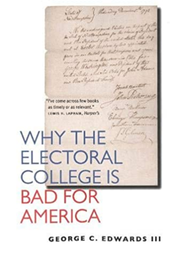A WRITER'S WIT |
My Book World

For years the electoral college mystified me, but it seemed like a concept that worked because more or less the right candidate always won both the popular vote and the electoral college vote. Then came the 2000 election, a bizarre turn of events by which five people on the Supreme Court would, through their action/inaction allow the candidate with fewer popular votes to win. And one of those justices would tell the rest of us to get over it—instead of taking the time, like a reasoned person, to explain to us why we should get over it, why their decision was such a wise one. Another justice, years later, before her death, would confess that she regretted her vote. Nice. I hope it made her feel better. The electoral college is a roulette wheel that is loaded. Rigged. Like any roulette wheel, we don’t really know until the last second which way the falseness is going to lie.
Author Edwards logically and factually proves his thesis as to why the electoral college ought to be drummed out of existence. Interestingly, instead of beginning with the historical context of its origins, he begins with how the electoral college works, how it among other things, cheats the voters in a particular state who vote for the “losing” candidate who may actually have more popular votes. Most important in his discussions may be the idea of political equality or more important the political inequity that the electoral college tends to foster. The biggest takeaway from Edwards’s chapter on history is the recorded fact that the electoral college was not a well-thought-out concept that received rigorous attention from its founders. No, Philadelphia was hot that summer, and men [and I mean only men] formed the electoral college in a hurry, so that they could find cooler places in which to spend the rest of their summer vacations. At every turn, Edwards has an answer for those who would retain the electoral college, especially by noting when the proponents begin with false premises. The e.c. does not protect the smaller states, as some claim. It does not maintain cohesion and harmony among citizens. Candidates are not more attentive to small states with a low number of electors nor to large states that are entrenched in one party or another.
In the book’s foreword, scholar Neal R. Peirce sums up what is most flawed about the electoral college: “The electoral college process, Edwards reminds us, doesn’t simply aggregate or reflect popular votes; it consistently distorts and often directly misrepresents the votes citizens have cast. Indeed, the unit vote actually takes votes of the minority in individual states and awards those votes, in the national count, to the candidate they opposed” (x).
Don’t worry that Edwards’s tome was published in 2004; nothing much has changed concerning the institution. Author Edwards’s study is prescient in that he states emphatically that what happened in 2000 with Bush v. Gore will happen again. Voilà, 2016! The United States must abolish the electoral college when it comes to voting for the office of the president. The time to do so has past.
[This book published by Yale University Press has, by my count, five typographical errors derived mainly from a lack of close reading by copy editors—rather egregious for an Ivy League press, eh?]
NEXT FRIDAY: My Book World | Oscar Lewis's Five Families: Mexican Case Studies in the Culture of Poverty



 RSS Feed
RSS Feed